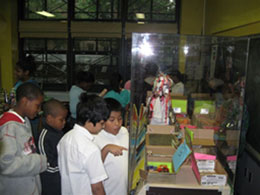
Begun in 1985 as a literacy program utilizing visual art books to teach English to children from mainland China,
SEQARTKIDS has, in the last quarter-century, grown into a full-fledged integrated arts education program.
SEQARTKIDS is a proven success and has been presented in dozens of NYC public schools.
The photograph below, by a 5th-grade SEQARTKIDS student, won First Prize in the NYC Department of Education's 2008 citywide competition. The Chancellor presented the prize, and the winning photograph was included in "PS Architecture," a public exhibition at The Center for Architecture in Manhattan.
"The assignment I had for this picture to be taken was a pattern assignment. We had to look for patterns around our neighborhood. We also have to look for patterns in society. This photo was taking place in the park by my school. In my photo, I felt as if I was hidden or locked up. I felt this way because I was crouching underneath the bridges and no one saw me. Also, the ladders were all around me and I thought I couldn't get out. I was having a feeling of entrapment." -Raphaela, 5th grade, SEQARTKIDS
We are proud of SEQARTKIDS and our:
- Select staff of highly experienced artist teachers.
- Consistent, effective, and flexible workshop design.
- Careful and consistent management and supervision systems.
- Unique scaffolded and recursive learning techniques.
- In-depth evaluation and assessment processes by which the program is continually adjusted and improved.
SEQARTKIDS workshops are available to all NYC public schools and are proven to:
- Develop a professional level of artistic competence.
- Build written, spoken, and non-verbal communication and social skills.
- Spark innate abilities for decision-making and constructive criticism.
- Train motor abilities.
- Promote ecological awareness.
- Instill pride throughout a school and its community.
- Inspire insight into international cultures.
- Help students control their processes of memory by reflecting on their own biographies and correlating their lives to art and other aspects of society.

Franklin Furnace's mission to embed the value of visual art in everyday life works hand-in-hand with the goals of its SEQARTKIDS program, which utilizes a variety of visual art practices as tools to achieve higher standards of learning in the classroom.
Three positive habits of mind are directly attributable to SEQARTKIDS instruction are:
- Persistence - Visual arts projects, properly conceived, demand attention to detail and a level of complexity rarely evident in traditional subjects.
- Expression - Art is a uniquely creative discipline for which a student's inner voice and natural creativity are essential components of a successful arts portfolio.
- The ability to make connections - The study of the visual arts necessitates making connections between the classroom and the world outside. The arts reflect the tensions and ambiguities implicit in phenomena such as globalization, climate change, and economic disparity.
The mental attributes described above are compelling influences on a lifetime of positive behavior and nonstop learning. As Ellen Winner and Lois Hetland, professors and researchers at Project Zero at the Harvard Graduate School of Education wrote in Art for Our Sake, "For students living in a rapidly changing world, the arts teach vital modes of seeing, imagining, inventing and thinking." Parents and teachers consistently witness positive habits of mind resulting from SEQARTKIDS, which reinforces the core curriculum and helps students prepare for tests by ensuring that those who do not excel at linear thinking and learning are served with rich and varied programs that meet their needs and help them experience mastery.

